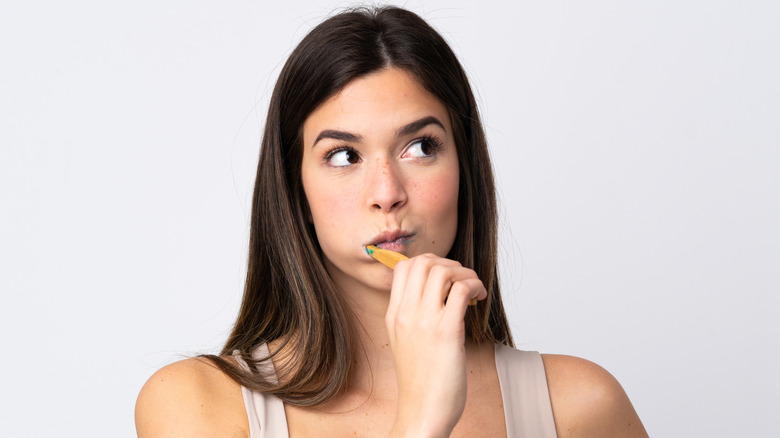How To Prevent Pesky Wine Teeth And Keep Pearly Whites Bright
Wine, particularly red, has been associated with health benefits because of its antioxidant and anti-inflammatory properties, per Medical News Today. It has been touted as one of the healthiest wines you can put in your body. A 2019 YouGov America survey found that red wine came out on top as the most consumed at 69%, followed closely by white and rosé.
Despite its popularity among wine-drinking adults and its increased consumption during the festive season, most wine drinkers are likely aware of wine teeth: an embarrassing situation where they find themselves sporting a mouth (and teeth) that are tinted purple after consuming the alcohol (via Vox). Contrary to what you might believe the surface of your teeth looks like, "the outer layer of the tooth, the enamel, contains many thousands of microscopic pores," says dentist and educator Dr. Marc Schlenoff speaking to New York Mag. The tannin, acids, and dyes found in red wine fill these pores and give them that blueish-red shade that prevents you from confidently showing your pearly whites for the group photo during the office Christmas party, as explained by Silverado Family Dental.
Does this mean you have to swear off your favorite choice of alcohol? No. There are, fortunately, a few things you can be doing and not doing to prevent pesky wine teeth and keep a bright smile.
Avoid wine teeth by doing these
Dentist Dr. Uchenna Akosa shares that "the strength of your enamel and how prone you are to plaque build-up is key to how much your teeth might stain," per U.S. News and World Report. She advises that one thing you can do to maintain bright pearly whites while drinking red wine is to brush your teeth before you consume any. If you've forgotten your toothbrush at home, pop into a nearby store and buy yourself some sugar-free gum; this should do the trick of removing plaque buildup as well, reports Silverado Family Dental.
Another thing you can do is to drink some water after you consume red wine. This will not only help prevent pesky wine teeth but will also keep you from getting uncomfortably drunk at the party where you want to impress someone, according to PopSugar Beauty. Water promotes "saliva flow" in your mouth and so does munching on food like cheese (via U.S. News and World Report) and high-fiber vegetables, per PopSugar Beauty. It also decreases the acidity of the wine.
If you're not too worried about how your wine drinking looks to others, you can opt to consume the alcohol using a straw, and for a quick method of getting rid of wine stains before a photo op, turn to teeth wipes (per Silverado Family Dental).
Don't do these and keep your teeth pearly white
Even though it might be tough to stick to one choice of wine for the entire night, you will be doing your teeth a big favor by doing so, according to dental expert Dr. Uchenna Akosa. Switching between wines — particularly drinking white before red — can make matters worse, according to U.S. News and World Report. White wine is actually higher in acidity and can contribute to more stainable "pores in your teeth" (via Silverado Family Dental).
Another thing you shouldn't be doing is brushing your teeth right after consuming the wine, shares Akosa. The acidity found in red wine can make your teeth vulnerable to damage and can contribute to wine teeth, per Neal J. Postel. Wait about 30 minutes before you brush your teeth and head to bed. Contrary to what some people might tell you, sucking on lime or coating your teeth with lemon juice and baking soda won't help so don't turn to these methods before consuming wine, adds Silverado Family Dental. You'll be contributing to increased and damaging acid content again if you did this.
Yes, wine is one of those foods that stain your teeth but this doesn't mean that you have to suffer from wine teeth at every party you attend. Follow these simple tips to keep your smile nice and white.


